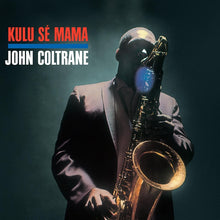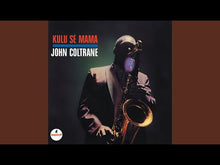John Coltrane - Kulu Se Mama LP (Endless Happiness, 2021)
Recently imported Russian reissue of what is believed to be the final release of Coltrane's music during his lifetime.
"A vibrant and accessible album from saxophonist John Coltrane's late-middle period, Kulu Se Mama has been only fitfully on catalogue since its original release in early 1967, and has tended to be overlooked in favor of near contemporaneous works like A Love Supreme (Impulse!, 1965) and Ascension (Impulse!, 1966), elements from both of which it reprises.
The three-track album, recorded in June ("Vigil," "Welcome") and October ("Kulu Se Mama") 1965 and released in January 1967, sees Coltrane return, for the near 19-minute title track, to the medium sized line-up used on Ascension, recorded in June 1965 and released in February 1966 . This time the band is an eight-piece rather than a ten-piece; Pharoah Sanders once again plays second tenor saxophone, but on "Kulu Se Mama" the line-up is drums and percussion rather than horn heavy as on Ascension. Coltrane's regular (and posthumously "classic") quartet—with pianist McCoy Tyner, bassist Jimmy Garrison and drummer Elvin Jones—is augmented by Sanders, bassist/bass clarinetist Donald Garrett, drummer Frank Butler and percussionist/vocalist Juno Lewis. Lewis, who wrote the poem, reproduced in full on the inner sleeve, which inspired the tune, plays some half dozen different drums and percussion instruments. "Welcome" is performed by the unaccompanied classic quartet, "Vigil" by Coltrane and Jones alone.
If it had been created in the 2000s, "Kulu Se Mama" might be labeled groove or even jam band music. After an atmospheric, out-of-time introduction, it settles into a lyrical, vamp-driven, African-informed piece. There are funky, split-tone solos from Coltrane and Sanders, a magnificently moody solo from Tyner, and a concluding section pairing Lewis' chant-like vocal and Garrett's bass clarinet. The basses, drums and percussion maintain a neo-African groove throughout. Anyone who enjoys the astral jazz of albums like Sanders' Tauhid (Impulse!, 1967), or pianist/harpist Alice Coltrane's Ptah, The El Daoud (Impulse!, 1970), will love "Kulu Se Mama."
"Vigil" is a moderately challenging, motor-rhythm free, saxophone and drums feature. The quartet's "Welcome" is a more serene and amiable affair in which at one point Coltrane references the tune to "Happy Birthday To You." Both are excellent, but it is the transporting "Kulu Se Mama" which is the main event. It's good to see it emerge from the sidelines again." - All About Jazz



